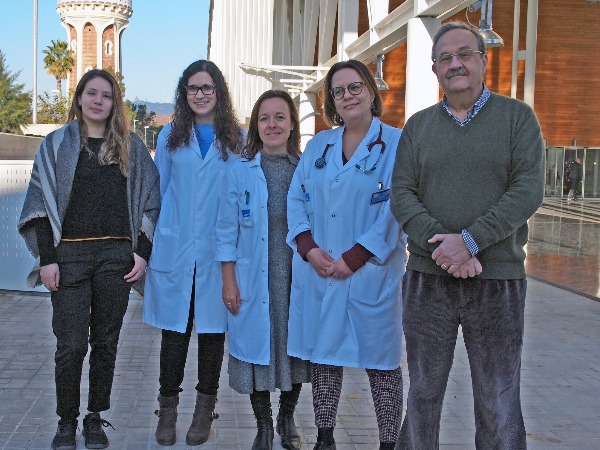
21/01/2020 - Press release
A simple blood test could help guide the antiviral treatment given to these patients
Cytomegalovirus infection is a highly prevalent pathology among patients who have undergone a kidney transplant. Studies carried out at the Hospital del Mar and the Hospital del Mar Medical Research Institute indicate that it affects up to 30% of patients in the 6-month period following the operation. That is why finding elements that can act as infection risk markers for this virus is so important. A team of doctors from the hospital and researchers from the IMIM have demonstrated the role that one type of immune system cell, NK (Natural Killer) cells expressing a specific receptor (NKG2C), plays in predicting the risk of developing infection, complementing the existing conventional marker based on T-cell analysis.
Cytomegalovirus infection is very common in the population, and in many cases the virus causes no health problems. However, if the immune system is weakened, for instance in the case of a transplant where immunosuppressive treatment is prescribed to prevent rejection, there may be a new infection or the virus may be reactivated. In these cases, the infection may cause clinical symptoms. The infection has also been linked to the development of other long-term problems (chronic graft rejection and cardiovascular pathology). For this reason, patients at a higher risk receive prophylactic treatment in an attempt to prevent the disease.
In this context, "Understanding the role of NKs and T cells would help us establish the risk of cytomegalovirus infection more accurately, prior to the transplant, and we could modify treatment strategies accordingly", explains Dr. Marta Crespo, one of the main authors of the study, head of the Renal Transplant section of the Nephrology Department at Hospital del Mar and a researcher in the IMIM Nephropathies Group. This work could therefore assist in regulating preventive treatment in some patients, reducing their side effects.

Some of the team members who conducted the study. From left to right, Michelle Ataya, Laura Llinàs, Marta Crespo, Dolores Redondo and Miguel López-Botet
With a blood test
The presence of NK cells with the NKG2C receptor in the blood varies in different people, but it increases in those who have been infected by cytomegalovirus as this helps the immune system to better control any possible reactivation of the virus. As pointed out by the final author of the study, Dr. Miguel López-Botet, head of the Immunology Service at Hospital del Mar, coordinator of the Immunity and Infection Research Group at the IMIM and a professor at Pompeu Fabra University, "Having these cells helps protect the individual from developing cytomegalovirus infection after receiving a transplant."
Furthermore, Dr. López-Botet reminds us that we must also bear in mind the important role played by other immune system cells, the T-cells. In summary, he highlights that "We have made progress in our understanding of the mechanisms controlling post-transplant infection, and this may lead to the development of a new biomarker that defines risk and improves therapeutic intervention".
The study analysed data from 145 patients who had a kidney transplant, 48 of whom were found to be infected. Blood tests were used to analyse the presence of NK cells with the NKG2C marker, as well as their levels, confirming that patients with higher levels were better protected against cytomegalovirus. Compared to currently available diagnostic techniques, this is a simple, low-cost test that can help predict the risk of infection by this virus in transplant recipients. The researchers have not analysed whether these results can be extrapolated to patients undergoing other types of transplant, but they suggest that the findings are likely to be transferable.
Reference article
Michelle Ataya, Dolores Redondo?Pachón, Laura Llinàs?Mallol, José Yélamos, Gemma Heredia, María J. Pérez?Sáez, Joan Vila, Marcel Costa?García, Dàlia Raïch?Regué, Carlos Vilches, Julio Pascual, Marta Crespo, Miguel López?Botet. Pretransplant adaptive NKG2C+ NK cells protect against cytomegalovirus infection in kidney transplant recipients. Am J Transplant. 2019; 00: 1- 14. https://doi.org/10.1111/ajt.15658
Further information
IMIM/Hospital del Mar Communications Service: David Collantes 600402785 [email protected], Marta Calsina 93 3160680 [email protected], Rosa Manaut, 618509885 [email protected]
© Institut Hospital del Mar
d'Investigacions MèdiquesLegal Notice and Privacy Policy | Cookie Policy | Site Index | Accessibility | Find Us | Contact